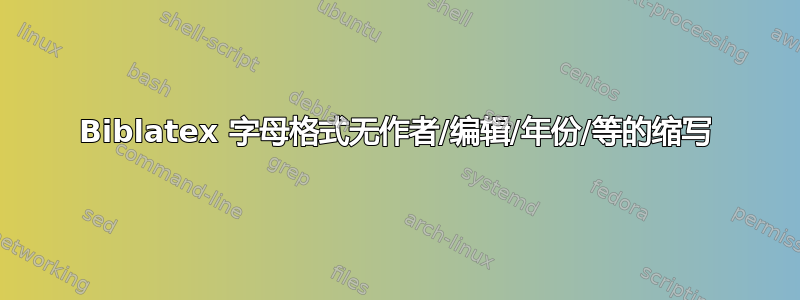
我在 biblatex 中使用字母顺序引用样式。有时我会有一些条目没有给出作者、编辑或年份。例如,会议论文集通常没有编辑。目前我将条目留空editor,但我想改变这种行为,以便 biblatex 在参考书目中自动打印“s.ed.”(拉丁文 sine editore)。
当我将其写入字段时,editor我得到了s.ed. (Ed.)。所以我需要阻止输出(Ed.),但我不知道在哪里实现这一点。
以同样的方式打印以下条目(见关联德语)当该字段通常是必填项类型时:
- 'sa' (拉丁语 sine auctore,“无作者”)
- “s.ed.”(拉丁语 sine editore“无编辑”)
- 'sa' (拉丁语 sine anno“无年份”)
- ‘st’(拉丁语 sine titulo“无标题”)
- ‘sl’(拉丁语 sine loco“无位置”)
- “s.ed.”(拉丁语 sine editore“无出版商”)
目前我不知道如何处理文本中引用的缺失作者或年份,因为这样[ABCs.a.]看起来不太好。因此,欢迎提出建议 ;)
梅威瑟:
MWE 说明了缺失条目的不同情况。我总是手动将缩写写入字段(第二个条目除外),以说明输出应该是什么样子。除了没有给出编辑器的情况外,输出是正确的,因为输出是,s.ed., ed.但它应该是s.ed.。这是我需要帮助来修复它的第一个点。
如果我稍后想将缩写从拉丁语改为英语,这将是一项复杂的任务。因此,这是我需要帮助解决以下问题的第二个点:
我想要实现的是告诉 biblatex 我没有特定字段的值,并且我想打印适当的缩写来向读者说明该字段没有可用信息(可能是这样的命令\noauthor)。 如果我只是将该字段留空,它应该被解释为忽略该字段,就像 biblatex 对第二个条目所做的那样noAuthor2 WARN - The field 'author' in entry 'noAuthor2' cannot be null, deleting it。
\documentclass{article}
\usepackage[backend=biber,style=alphabetic, autocite=footnote]{biblatex}
\begin{filecontents*}{bibliography.bib}
% Example for no author
@BOOK{noAuthor,
author = {s.a.},
title = {Rocket Propulsion and Spaceflight Dynamics},
year = {1979},
location = {New York},
publisher = {Pitman},
}
% Example for no author and field left empty
@BOOK{noAuthor2,
author = {},
title = {Rocket Propulsion and Spaceflight Dynamics},
year = {1979},
location = {New York},
publisher = {Pitman},
}
% Example for no editor
@Collection{noEditor,
editor = {s.ed.},
title = {Book of light},
year = {1985},
publisher = {Springer Science+Business Media, LLC},
location = {New York}
}
% Example for an incollection where the collection has no editor
@Incollection{noEditor,
crossref = {noEditor},
author = {Wayne, John},
title = {Some nice title},
pages = {10--20},
bookpagination = {page},
}
% Example for no year
@BOOK{noYear,
author = {Cornelisse, J. W. and Schoeyer, H. Ferry R. and Wakker, Karel F.},
title = {Rocket Propulsion and Spaceflight Dynamics},
year = {s.a.},
location = {New York},
publisher = {Pitman},
}
% Example for no title
@BOOK{noTitle,
author = {Cornelisse, J. W. and Schoeyer, H. Ferry R. and Wakker, Karel F.},
title = {s.t.},
year = {1979},
location = {New York},
publisher = {Pitman},
}
% Example for no location
@BOOK{noLocation,
author = {Cornelisse, J. W. and Schoeyer, H. Ferry R. and Wakker, Karel F.},
title = {Rocket Propulsion and Spaceflight Dynamics},
year = {1979},
location = {s.l.},
publisher = {Pitman},
}
% Example for no publisher
@BOOK{noPublisher,
author = {Cornelisse, J. W. and Schoeyer, H. Ferry R. and Wakker, Karel F.},
title = {Rocket Propulsion and Spaceflight Dynamics},
year = {1979},
location = {New York},
publisher = {s.ed.},
}
\end{filecontents*}
\addbibresource{bibliography.bib}
\nocite{*}
\begin{document}
\null
\vfill
\printbibliography
\end{document}
答案1
这是一个开始。这不是一个完整的解决方案,但对于评论来说太长了。它并没有完全解决编辑器问题,尽管它确实适用于与问题的 MWE 中的条目类似的条目。
基本上,这个想法是在你的 中创建一系列书目字符串biblatex.cfg(如果你以前从未使用过,则可能需要创建 - 我的tex/latex/config/在 my下TEXMFHOME)。然后,你为所需的每种语言指定这些字符串的值,并创建一些宏来生成字符串。宏将生成适合活动语言的任何字符串。在你的.bib文件中,你使用新的宏,例如\noauthor。处理后,这些将替换为相关语言的指定字符串,例如s.a.forenglish或其他。
如果稍后您决定要为给定语言使用不同的字符串,则可以编辑字符串,即,biblatex.cfg每个要重新定义的字符串都需要编辑一次。如果您需要使用新语言,则可以为相应的语言添加一组额外的字符串,而无需覆盖现有的字符串。
\documentclass[english]{article}
\usepackage{filecontents}
\begin{filecontents}{biblatex.cfg}
\NewBibliographyString{noauthor}
\NewBibliographyString{noeditor}
\NewBibliographyString{nodate}
\NewBibliographyString{notitle}
\NewBibliographyString{nolocation}
\NewBibliographyString{nopublisher}
\DefineBibliographyStrings{english}{%
noauthor = {s\adddot a\adddot},
noeditor = {s\adddot ed\adddot},
nodate = {s\adddot a\adddot},
notitle = {s\adddot t\adddot},
nolocation = {s\adddot l\adddot},
nopublisher = {s\adddot ed\adddot},
}
\newcommand*\nosomethings{noauthor,noeditor,nodate,notitle,nolocation,nopublisher}
\@for \xx:=\nosomethings \do {%
\expandafter\ifcsname\xx\endcsname\relax\else
\expandafter\expandafter\expandafter\expandafter\edef\csname\xx\endcsname{\noexpand\bibstring{\xx}}%
\fi}
\end{filecontents}
\usepackage[backend=biber, style=alphabetic, autocite=footnote]{biblatex}
\begin{filecontents}{bibliography.bib}
% Example for no author
@BOOK{noAuthor,
author = {\noauthor},
title = {Rocket Propulsion and Spaceflight Dynamics},
year = {1979},
location = {New York},
publisher = {Pitman},
}
% Example for no author and field left empty
@BOOK{noAuthor2,
author = {},
title = {Rocket Propulsion and Spaceflight Dynamics},
year = {1979},
location = {New York},
publisher = {Pitman},
}
% Example for no editor
@Collection{noEditor,
editor = {\noeditor},
title = {Book of light},
year = {1985},
publisher = {Springer Science+Business Media, LLC},
location = {New York}
}
@Collection{noEditor2,
editor = {\noeditor},
title = {Book of Darkness},
year = {1945},
publisher = {Oxford University Press},
location = {Oxford},
isbn = {01234556789X}
}
@Collection{noEditor3,
editor = {\noeditor},
title = {Book of Greyness},
year = {1045},
publisher = {Cambridge University Press},
location = {Cambridge},
isbn = {01234879890789X}
}
@Collection{Editor,
editor = {Ditor, E.},
title = {Book of light},
year = {1985},
publisher = {Springer Science+Business Media, LLC},
location = {New York}
}
% Example for no year
@BOOK{noYear,
author = {Cornelisse, J. W. and Schoeyer, H. Ferry R. and Wakker, Karel F.},
title = {Rocket Propulsion and Spaceflight Dynamics},
year = {\nodate},
location = {New York},
publisher = {Pitman},
}
% Example for no title
@BOOK{noTitle,
author = {Cornelisse, J. W. and Schoeyer, H. Ferry R. and Wakker, Karel F.},
title = {\notitle},
year = {1979},
location = {New York},
publisher = {Pitman},
}
% Example for no location
@BOOK{noLocation,
author = {Cornelisse, J. W. and Schoeyer, H. Ferry R. and Wakker, Karel F.},
title = {Rocket Propulsion and Spaceflight Dynamics},
year = {1979},
location = {\nolocation},
publisher = {Pitman},
}
% Example for no publisher
@BOOK{noPublisher,
author = {Cornelisse, J. W. and Schoeyer, H. Ferry R. and Wakker, Karel F.},
title = {Rocket Propulsion and Spaceflight Dynamics},
year = {1979},
location = {New York},
publisher = {\nopublisher},
}
\end{filecontents}
\addbibresource{bibliography.bib}
\newif\ifuseeditorstg
\useeditorstgfalse
\useeditorstgtrue
\renewbibmacro*{editor}{%
\ifboolexpr{
test \ifuseeditor
and
not test {\ifnameundef{editor}}
}
{\printnames{editor}%
\setunit{\addcomma\space}%
\mystringtestnamehash\ifuseeditorstg\usebibmacro{editorstrg}\fi%
\clearname{editor}}
{}}
\renewbibmacro*{editor+others}{%
\ifboolexpr{
test \ifuseeditor
and
not test {\ifnameundef{editor}}
}
{\printnames{editor}%
\setunit{\addcomma\space}%
\mystringtestnamehash\ifuseeditorstg\usebibmacro{editorstrg}\fi%
\clearname{editor}}
{}}
% based on Andrew Swann's answer at http://tex.stackexchange.com/a/169379
\edef\noeditornamehash{\detokenize{a811c44f19354a66e35057fa5cdb5ad2}}
\newcommand*\mystringtestnamehash{%
\edef\tempa{\strfield{namehash}}%
\ifx\noeditornamehash\tempa\useeditorstgfalse\else\useeditorstgtrue\fi}
\begin{document}
\nocite{*}
\printbibliography
\end{document}



